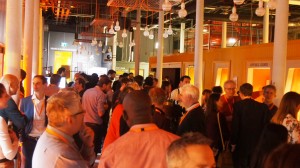Bristol is to become a ‘living laboratory’ by harnessing the power of the city’s already strong cross-sector collaboration to speed up innovations in areas such as transport and infrastructure.
It is to become home to the UKCRIC Bristol Collaboratory, which will establish Bristol as a testbed for new ideas. 
It will bring together existing innovators such as the Bristol is Open smart city organisation, the city council, the University of Bristol and the city’s highly-successful Engine Shed enterprise hub.
The university is one of 14 partners in the UK Collaboratorium for Research in Infrastructure and Cities (UKCRIC) which has secured £138m to develop a world-class, national infrastructure research community.
The UKCRIC Bristol Collaboratory was announced this week at the fifth anniversary celebrations for Engine Shed, pictured.
UKRIC Bristol infrastructure collaboratory lead Dr Theo Tryfonas told the gathering of 200 guests: “The UKCRIC Bristol Collaboratory will establish Bristol as a ‘living laboratory’ and support transdisciplinary communities of academics, industry, and citizens to address shared infrastructure and city problems.
“By bringing together a range of initiatives and activities, the Bristol Infrastructure Collaboratory will create accessible engagement and co-production spaces open to citizens and young people.
“Relocatable laboratories will also take UKCRIC activities into schools and communities that would not normally have access to or engage with such activities.”
Research into infrastructure will take as its starting point the fact that inadequate systems cost the nation £2m a day, and extreme events can cost hundreds of millions more.
The Collaboratory will work with citizens, local government and industry partners to investigate how city infrastructure systems interact with each other and with people.
By mapping, monitoring and testing real urban systems, academics will be able to discover how they can be refined in future, including a range of complex systems such as low carbon energy networks, transport infrastructure and flood management.
As well as the Bristol Infrastructure Collaboratory, which is hosted and led by the University of Bristol, the National Soil-Foundation-Structure Interaction Facility (SoFSI) is also based at the university.
SoFSI is tackling limited understanding about the interaction of structures, such offshore wind turbines and rail tracks, with the surrounding soil. At present, this knowledge gap leads to conservatism in design, construction and operation and drives up costs while suppressing innovation.
The university’s world-leading facility includes a 50-tonne ‘shaking table’ which enables academics to conduct detailed prototype research that aims to remove some of the investment risks prohibiting innovation; as with pioneering techniques to extend the life of buildings, for example.
Engine Shed’s fifth birthday celebrations also served as a reflection on the past five years of achievements and progress, as well as setting out its ambitions for the next five and beyond. Attendees were invited to bring along a ‘future leader’ and share their ideas and visions on an interactive graffiti wall.
Addressing the guests, Engine Shed director Nick Sturge said: “We are now one third into the experiment, one third into the lease on this fantastic building. We are proud of what we have achieved and learnt so far, and as we continue learning we are grateful to those who have helped us and those who will continue to help us for the next five years.
“In 2016, the Legatum Prosperity Index ranked Bristol as the best environment for business in the UK, and we hope we have played our part in that… However, Bristol also ranked 129th for overall prosperity, and that’s a problem – actually, an opportunity – to tap into the talent available here. We have to include everyone in the growth of the city region, otherwise we won’t have a sustainable economy. So we continue to look for projects and partners that will help us make an impact and a difference.
But it’s not just about the projects, it’s about the people: the people you talk to, the conversations you have, learning about other people’s perspectives, stories, businesses and cultures, is what will make Bristol and Bath a better place. Our role is to nudge provoke, experiment, and connect.”
Since launching in December 2014, Engine Shed has hosted an average 30,000 visitors per year, an estimated 150,000 in total including many primary school children, Royalty, members of HM Government, and overseas guests. It is currently running 19 projects to support growth, inclusion, and innovation in the Bristol city region, and working with 64 partners to deliver positive social and economic impact including the Diverse Workforce for the Future programme to engage young people with future careers, and the Scale Up Generator which supports scaling businesses in the region.
Now, five years into the ‘Engine Shed experiment,’ the need for idea sharing and collective intelligence is as important as ever. Engine Shed redistributes 30% of its surplus operating profits into running projects to drive sustainable, economic growth, which in turn generates increased use of Engine Shed’s services.
Engine Shed also launched a short film showcasing its projects and collaborations, and the benefits they reap for members and the wider Engine Shed community. The film was made in partnership with Friction Collective, and features tenants, members, and collaborators sharing their experiences working at Engine Shed.






























